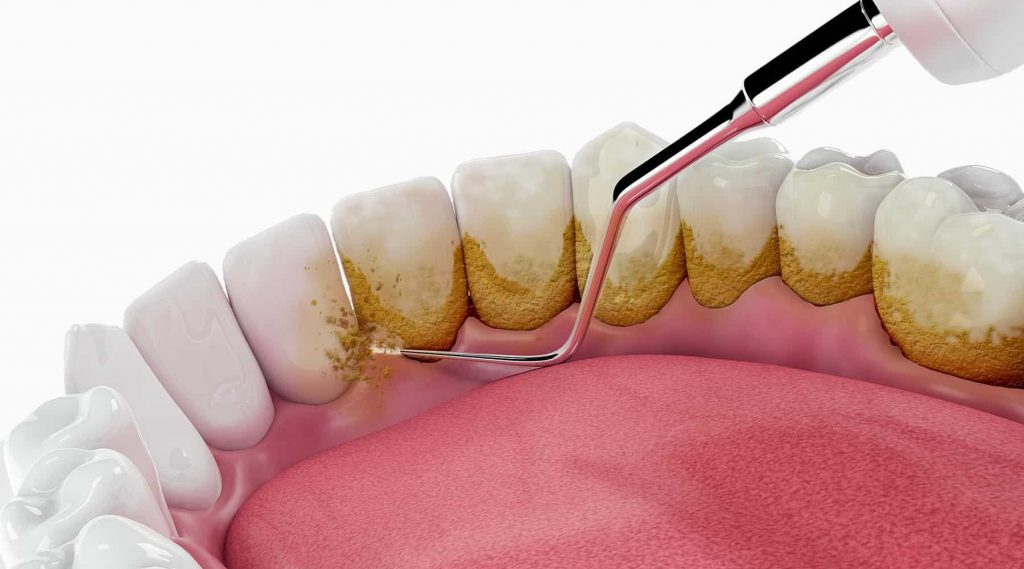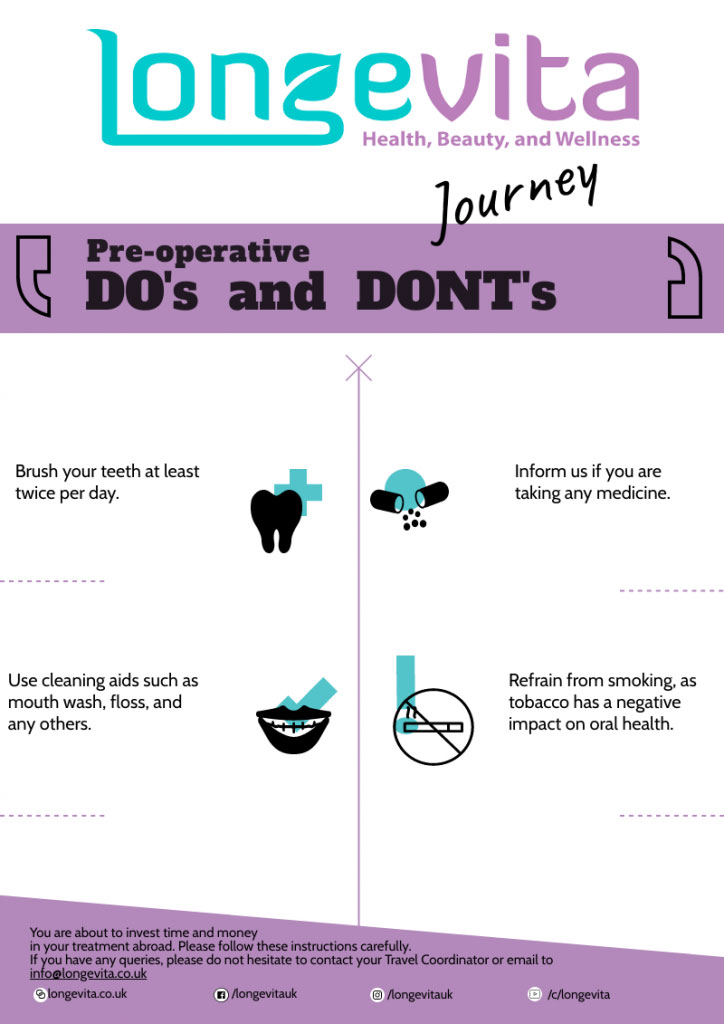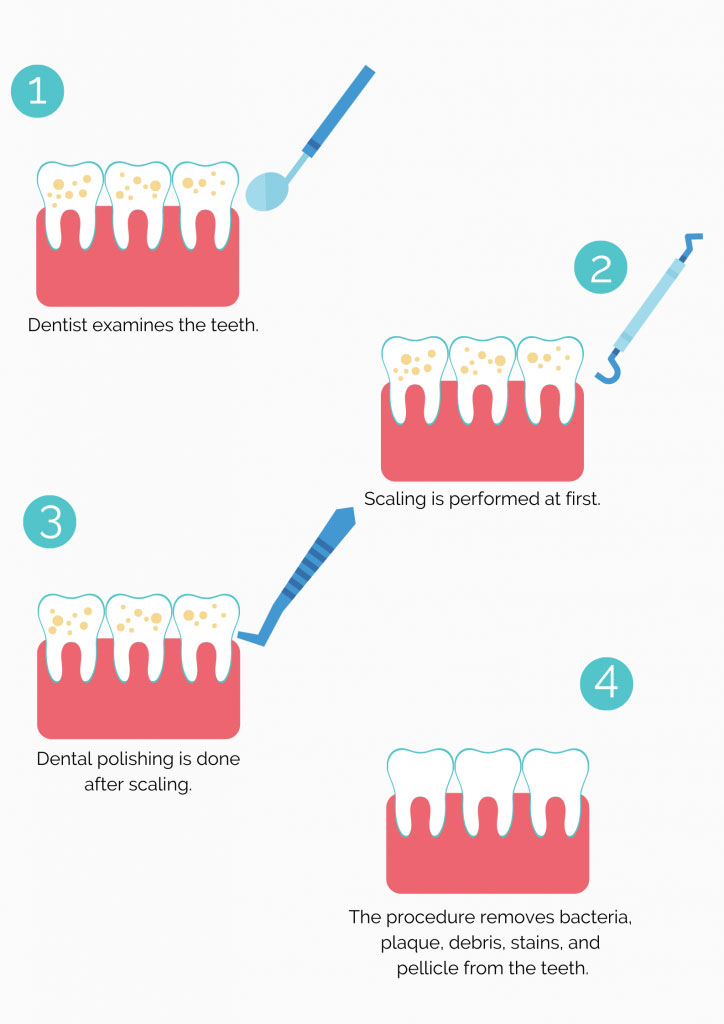Scale and polish, also known as an oral prophylaxis, refers to the removal of plaque, stains, and debris from the teeth to ensure a healthy smile. Routine cleaning keeps the teeth and gums clean.
What Are Scale and Polish?
Dental scaling and polishing are treatments that prevent gum diseases (gingivitis and periodontitis) from becoming more serious. They can also help in the prevention of tooth decay and gum disease altogether.
These treatments work by removing the hardened plaque on the surfaces of the teeth known as tartar or calculus that cannot be removed by toothbrushes.
The bacteria in these plaques can cause inflammation of the gums, creating pockets between them and the teeth, and trapping plaque below the gum line.
Left untreated, it can progress and can result in loose teeth, tooth loss, and loss of bone.
Dental polishing removes bacteria, plaque, debris, stains, and pellicle (protein biofilm) from the teeth. It also intends to smooth and shine the enamel.
If a person has tartar, though, polishing alone isn’t enough, which is why scaling is done, where plaque deposits are removed from above and below the gum line using special instruments.
Keep in mind that teeth scaling and polishing alone aren’t a substitute for your at-home oral hygiene routine.

What Is The Cost Of Scale and Polish?
In Turkey, a scale and polish treatment might only cost you around £50.
Generally, it is cheap, but you may save even more by getting it in Turkey.
The reason for this is the cost of living and the Turkish economy itself.
You can buy more for a pound in Turkey than in the UK, US, or Europe.
You can also get more competitive prices for this treatment because of thriving medical tourism.
Who Can Have Scale and Polish & Why?
Commonly, scale and polish are used to address concerns regarding gum disease, either to prevent it or slow its progression.
According to a study published by the American Dental Association, scaling and root planing can benefit people who have chronic periodontitis.
However, scale and polish can also help people with gingivitis – less severe than periodontitis. It’s not only for patients with these diseases, though.
You can also get it for preventative purposes to ensure good oral health.
Contraindications for Scale and Polish
Scaling and polishing are contraindicated in the following instances:
- Presence of endogenous or intrinsic stains
- Very sensitive teeth
- Untreated dental caries
- Exposed tooth roots or dentin
- Gum recession
First, the patient is treated for these dental problems, followed by a scale and polish.
Am I Suitable For Scale and Polish?
What To Think About Before You Have Scale and Polish?
When getting a scale and polish treatment, you should ask the dentist about their credentials. In addition, you need to learn about the registration of the clinic.
Then, you should ask questions related to the procedure itself, its recovery, and aftercare. You must communicate your goals to the dentist from this treatment. Many people confuse it with teeth whitening.
Scaling and polishing are not cosmetic procedures, however. Improving oral health is what it primarily aims for. It’s best if you take a look at the before and after photos of patients.
How Best To Prepare For Scale and Polish?
Before coming in for your scheduled dental scaling and polishing, you should inform the dentist of your health condition.
If you’re suffering from any health issue (including oral), you may need to get treated for it first.
Other than that, you should make sure that your teeth are clean, which means brushing and flossing.
Lastly, do not do any at-home teeth whitening before the procedure, as it can cause more sensitivity.

What Is The Procedure For Scale and Polish?

Once you arrive at the clinic, the dentist will take a look at your teeth. Since the procedure does not cause any pain, local anaesthesia isn’t needed.
First comes dental scaling. In this, a hooked metal tool scrapes the plaque and tartar, sticking to the teeth below and above the gum line.
Dental polishing is done after scaling. It can take place manually or through engine-driven devices.
A drill with a rotating rubber cup or brush at its end is dipped into a special paste called prophy (short for prophylaxis) paste.
It usually has a gritty texture and helps in the removal of plaque and debris.
In addition to rubber or bristle-brush polishing, air polishing may also be performed.
A pressurised jet containing a combination of water and abrasive substances cleans the areas between the teeth, which cannot be reached by the bristles.
It also helps in the cleaning of more severe stains. It’s also possible for dental polishing to take place while you’re getting dental surgery.
Known as therapeutic polishing, it helps clean the roots of the teeth.
Book A Free Consultation With Our Patient Consultants
We offer free consultations for patients across the UK & Ireland, so you can discuss your individual requirements with our specialists. Book A Free Consultation With Our Patient Consultants Today.
Recovery & Results Of Scale and Polish
Since deep scaling and polish is a non-invasive procedure, it has no downtime. You’d see the results immediately after.
However, if you have calculus, you may need more than one session to achieve the desired results.
You should also know that scaling and polishing do not give permanent results. It’s important to get regular cleaning every 6 months.
However, some people require these more frequently, such as those who smoke, have diabetes, or have gum disease.
Aftercare Of Scale and Polish
In order to maintain the results of your teeth scaling and polishing for a long time, it’s important that you take good care of your teeth.
For that, you need to use an antibacterial mouthwash, brush twice a day for two minutes, and floss.
In addition, you need to avoid the consumption of tobacco products and stay away from sugary, acidic foods.
Side Effects to Expect After Scale and Polish
After undergoing a scale and polish procedure, you may experience the following side effects:
Sensitivity: The polishing affects the enamel of the teeth, and it can make your teeth sensitive for a week after the procedure. It can give you a tingling sensation.
Pain: Since scaling probes the gum tissue deep into the pockets, it can cause pain for 1-2 days afterwards.
Tenderness: Your gums might also feel tender for a couple of days after scaling.
These side effects should resolve within a week, but if they persist, you should get in touch with your dentist.
What Could Go Wrong After A Scale and Polish?
Teeth scaling and polishing is a safe procedure. However, it carries a small risk of infection. To avoid this, you may need an antibacterial mouthwash.
Make sure to discuss this with your doctor.
Other than that, if the dentist is not as gentle with the polisher and applies excessive pressure, you may end up with sore, bleeding gums. This is temporary, though.
What To Do If You Have Problems After A Scale and Polish?
It is quite unlikely that you’ll experience any problems after getting this procedure.
However, if you feel like something’s not right, you can get in touch with the Aftercare team via email or call.
They will contact your dentist for a medical assessment.
Other Procedures to Have With Scale and Polish
You can have most of the dental procedures together with scale and polish.
However, the most common dental treatment that is combined with deep scaling and polish is teeth whitening.
By combining these, you can regain your oral health and restore your aesthetics.
Alternatives to Scale and Polish
Although dental scaling and polish can effectively clean the teeth, you should note that it is not an alternative for brushing and flossing.
One supplement to scaling is root planing, however. It differs from scaling in the following ways:
| Scaling | Root Planing | |
| Procedure | Removes plaque and calculus from the surface of the teeth below and above the gums | Smoothening the tooth roots, allowing their reattachment to the gum tissue |
| Anaesthesia | Can be performed without local anaesthesia | Local anaesthesia is usually needed to avoid pain |
| Purpose | Restore gum health | Restore gum health |
| Frequency of treatment | Every 6 months (more in some cases) | Every 6 months (more in some cases) |
| Specialisation | Can be performed by a dental hygienist | Performed by a periodontist |
FAQ
Does scaling and polishing whiten your teeth?
Scale and polish are for teeth “cleaning.” The removal of plaque, stains and debris during the procedure can make your teeth look a shade whiter.
However, it’s not a substitute for teeth whitening, which uses peroxide with the primary goal of whitening the teeth.
How long do scale and polish take?
It shouldn’t take over 30 minutes for the completion of the entire procedure.
However, the time can vary depending on how much plaque and tartar you have. The more regularly you get these cleanings, the less time it will take.
How effective are at-home scale polishes compared to dentists'?
When it comes to at-home scale polishes, most people do not know how much paste to use, for how long, and at what pressure.
If you overdo it, it can cause damage to the enamel, which can cause tooth decay.
In addition, it can make more bacteria stick to your teeth. This is why it’s better to get a professional dental scale and polish.
Do scale and polish hurt?
These treatments should not hurt, especially polishing. However, during scaling, you might feel some discomfort. If pain is a concern of yours, make sure to discuss it with your dentist.
Do scale and polish get rid of stains?
As far as the stains on the teeth are concerned, scaling and polishing can only remove those that are exogenous – existing on the outer surface.
These can include nicotine and caffeine stains. However, those resulting from the intake of antibiotics, illnesses, calcium deposits, or enamel hypoplasia are not treated by this.
Reviewed and approved by Dr. Izbel Aksit.